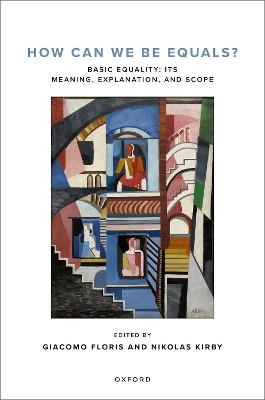
How Can We Be Equals?
Oxford University Press (Verlag)
978-0-19-287148-0 (ISBN)
This volume brings together leading thinkers on basic equality to address these questions. Collectively, they explore the concept of equality in history and criticism, analysing and presenting solutions to the most pressing challenges that have been raised against the principle.
Giacomo Floris is British Academy Fellow in Philosophy at the University of York. His main areas of research are in contemporary moral and political philosophy, with a particular interest in theories of moral status and basic equality, and theories of relational equality and distributive justice. His work has appeared in various journals, including Philosophical Studies, Journal of Ethics, European Journal of Political Theory, and Ethical Theory and Moral Practice. Nikolas Kirby is Lecturer in Politics at the University of Glasgow. Previously, he was Leverhulme Early Career Research Fellow, Departmental Lecturer in Philosophy and Public Policy, and Director of the Building Integrity Programme, Blavatnik School of Government, Oxford University. He was also a Democracy Visiting Fellow at the Kennedy School of Government, Harvard University.
Part I - Meaning: History and Critique
1: Teresa Bejan: On the Historical Emergence of Basic Human Equality
2: Jeremy Waldron: Basic and Relational Equality
3: Kasper Lippert-Rasmussen: Should People Who Are Moral Equals Relate as Social Equals? Should People Who Are Not Moral Equals Relate as Social Unequals?
4: Andrea Sangiovanni: Is There a Thing Called Moral Equality? (And Does It Matter if There Isn't?)
Part II - Justification: Grounding and Scepticism
5: Ian Carter: Basic Equality and the Contexts of Opacity Respect
6: Thomas Christiano: Equal Moral Status and the Collective Nature of Rationality
7: Nikolas Kirby: Basic Equality: Worth, Luck and Weight
8: Agnieszka Jaworska and Julie Tannenbaum: Equality and Moral Status: Challenges to Their Grounding
9: Anne Phillips: When Equality Needs No Justification
Part III - Scope: Inclusion and Marginalisation
10: Giacomo Floris: The Basis of Children's Moral Equality
11: Eva Feder Kittay: Basic Human Moral Equality
12: George Sher: First Among Equals
13: Richard Arneson: Basic Equality, Rational Agency Capacity, and Potentiality
| Erscheinungsdatum | 16.05.2024 |
|---|---|
| Verlagsort | Oxford |
| Sprache | englisch |
| Maße | 160 x 240 mm |
| Gewicht | 680 g |
| Themenwelt | Geisteswissenschaften ► Philosophie ► Ethik |
| Sozialwissenschaften ► Politik / Verwaltung ► Politische Theorie | |
| ISBN-10 | 0-19-287148-X / 019287148X |
| ISBN-13 | 978-0-19-287148-0 / 9780192871480 |
| Zustand | Neuware |
| Haben Sie eine Frage zum Produkt? |
aus dem Bereich


